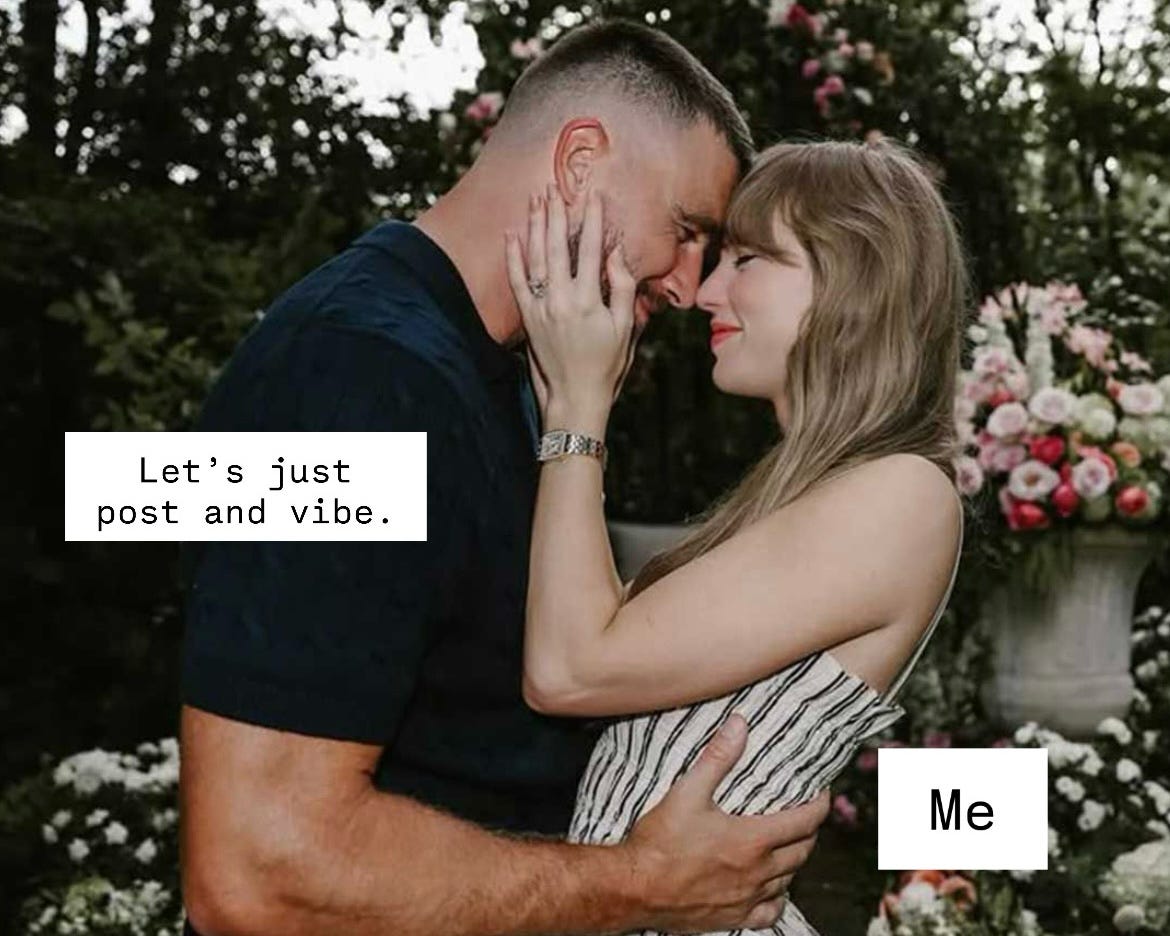The life of an Instagram girl
Spreadsheets or stories — must we really choose?
“She’s a content creator.”
That’s how someone introduced me the other day. I smiled, but inside, I bristled a little. I’ve always been cautious about being seen as an influencer, even if I do fit the label. Not because I’m ashamed, but because it feels like shorthand for something smaller than I am.
The truth is: I want everything.
And that’s where the problem begins, because no one can have everything in life.
In school, I was good at everything — writing, math, science. Not to be arrogant. Just honest. I could do both the numbers and the nuance.
I was speaking with a former accountant recently. He casually mentioned he’d been reading my newsletter, then added with a half-smile:
“You’re a really good writer.”
I said:
“I think everyone should write.”
He paused.
“Finance wiped out anything creative in me.”
Is it inevitable that we have to choose between spreadsheets and writing?
I had the opposite problem. After spending years in public relations, I got slow at math, slow enough that even my ex-boyfriend used to laugh at me. I was constantly thinking in multiple currencies, and sometimes, it felt like a disaster inside my brain. But you know, running a business takes real math skills.
Growing up on Instagram didn’t help either. I learned how to make something average look amazing: how to frame a moment, add a filter, and create FOMO out of thin air.
“I can make trash look like gold.”
I joked to a friend.
I think, deep down, I wanted to be seen as smarter than just an influencer or content creator. It’s a profession with a low barrier to entry; anyone with a phone can start, and it’s often unfairly associated with average intelligence.
I didn’t want to be dismissed before I even opened my mouth.
The other problem with being an Instagrammer is that it blurs the line between self-worth and engagement. It’s not easy to separate who you are from how many people are watching. Just because someone reacts to your Story doesn’t mean they care about you. And just because someone doesn’t react doesn’t mean they don’t. The danger is that it’s just enough junk dopamine to distract you from focusing on what really matters.
Personal boundaries become blurry. Suddenly, people from another continent can access you at any time. And it’s not just about attention, it’s about exposure.
Five years ago, I shared a video showing how young children have become vulnerable to predators on social media. It was part of a digital experiment. The results were disturbing. Underaged girl accounts were getting DMs asking for explicit photos and videos, all sorts of disturbing messages.
These days, my girlfriends and I, and even their friends, are all getting DMs from the same guy.
Suddenly, it becomes “normal” for some people to enter a stranger’s private space so casually, so confidently, as if the boundaries were never there to begin with.
“You match with these guys, and the next thing they do is start sexting and asking for pics.”
Obviously, OnlyFans has to be part of this conversation. Believe it or not, when I was exploring ways to monetize my account, I actually went around asking friends. Most of them had at least 35k followers.
A well-known photographer and filmmaker in Hong Kong told me:
“A legitimate journalist recently asked me if she should quit her channel to pursue OnlyFans videos. I guess that’s the money now.”
The ROI of Instagram isn’t obvious. You can have followers, engagement, and visibility, and still not know how to turn that into actual income. The life you see on someone’s profile rarely reflects the full reality.
Instagram creates the illusion that access is guaranteed. But maybe we’ve forgotten: we value what we invest in. If we don’t invest in anyone on a deeper level, how are we ever going to build a real connection? A DM isn’t an investment. Liking a Story isn’t either.
Commitment challenges you to grow. But these days, there are plenty of exit routes from discomfort.
A British guy, only 25 years old, told me:
“My friends and I are moving to Thailand to find a wife if things don’t work out in London.”
I asked him:
“Does that mean you’re buying love?”
He shrugged, still being honest:
“At least I’ll provide and she’ll love me.”
What people are facing isn’t just fear of commitment. It’s the choice paradox, the illusion that there’s always someone better. But someone becomes better when you actually invest in them.
As someone who’s worked in influencer marketing for years, I remember feeling uneasy about one part of the job: evaluating people based on follower counts and brand partnerships.
Suddenly, humans were reduced to data points: engagement rates, past collabs, audience size. And I started asking myself: who am I to decide who’s worth paying attention to, just based on numbers?
In the startup world, there’s a term called vanity metrics, surface-level numbers that look impressive at first glance but don’t reflect real business performance. Living on social media doesn’t mean knowing how to run a business. I learned that the hard way.
These days, when founders reach out for help, I hesitate before pointing them in another direction. After all, this is my domain expertise. I should support social growth. I recently helped a team launch their seed round, and our campaign hit 600k social media impressions on the launch video. But deep down, I know impressions and follower counts alone aren’t always the answer.
One thing’s for sure: social media has become social currency, and that currency now drives investor appetite.
Over time, I built a kind of content muscle, the ability to sense what will land, what will catch, what will resonate. It’s not something you can teach in a course. It’s part intuition, part repetition. You post enough, test enough, observe enough… and eventually, you just know.
Living on Instagram as a woman also comes with a kind of anxiety, the fear that my perceived value will depreciate over time, like an algorithm that favors youth and novelty over depth and growth.
But then there are women like Taylor Swift, reminding us that reinvention is the real algorithm. Her The Life of a Show Girl album announcement and that engagement post with Travis Kelce both shattered Instagram records.
“The female artists I know of have to remake themselves, like, 20 times more than the male artists, or else you're out of a job.”
I’m not sure this anxiety is unique to women. But as my friend, also an ex-founder and content creator, once put it perfectly:
“Being a content creator is no different from being an entrepreneur. You stay consistent, listen to data, collect feedback, and keep iterating.”
After all these years, the one thing I’ve learned to control is my consistency. So here I am, back to publishing on a Sunday.



